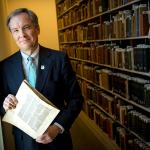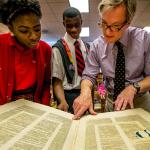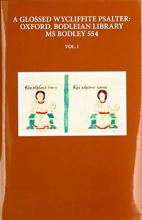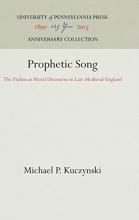Michael P. Kuczynski
Professor and Chair

Biography
Michael Kuczynski took his BA in English from St. Joseph's University, Philadelphia (1979), and his MA and PhD degrees in English and American literature from the University of North Carolina, Chapel Hill (1981, 1987). He specializes in Middle English literature (especially Chaucer), intersections between religion and literature in medieval and early modern England, and the relationship between poetry and the visual arts. He has published widely on medieval manuscripts, early modern books, and nineteenth-century antiquarianism.
Kuczynski researches medieval manuscripts (especially those connected with the first English translation of the Bible) in America and England, especially London and Oxford, and enjoys introducing students to this kind of hands-on documentary work in both his introductory and more advanced classes.
Kuczynski created and directs a community-based program, Archives and Outreach, designed to teach book history to local high school students. He is faculty fellow of the Honors Books and Reading Society and mentor to Tulane Posse 4, a college access and leadership group of ten young scholars from high schools across New Orleans run by the New York-based Posse Foundation (for more information, go to posse foundation.org).
Education
University of North Carolina, Chapel Hill
University of North Carolina, Chapel Hill
Saint Joseph’s University
Accomplishments
Suzanne and Stephen Weiss Presidential Fellowships
2016
Tulane University
Links
Articles
EXTRACTS FROM A REVISED VERSION OF RICHARD ROLLE'S ENGLISH PSALTER IN MS LONGLEAT 3, AN EARLY VERSION WYCLIFFITE BIBLE
In the early fi fteenth century, individuals sympathetic to Wycliffi te views revised more than once and extensively Richard Rolle’s English Psalter, a Middle English translation and exposition of the Latin Psalms and Canticles. Five substantial extracts from one of these Wycliffi te versions, hitherto unidentifi ed, appear as marginal glosses to Psalms i, iii, xix, xx, and xxi, according to the Vulgate numbering, in Warminster, Marquess of Bath, Longleat House MS 3 (hereafter simply Longleat), a copy of the Wycliffi te Bible in the early translation.
An Unpublished Middle English Version of the Epistola Lentuli: Text and Contexts
This essay presents an edition and discussion of a unique Middle English prose version of the Epistola Lentuli (‘Letter of Lentulus’), a neglected work of New Testament apocrypha, which purports to offer an eyewitness account of the bearing, facial characteristics, and demeanour of Jesus Christ. The Lentulus portrait, a thirteenth-century monastic invention, describes Christ’s ideal physical and moral beauty.
Theological Sophistication and the Middle English Religious Lyric: A Polemic
Impressive as it is, the 1999 Cambridge History of Medieval English Literature edited by David Wallace “failed to offer an account of the [Middle English] lyrics.” 2 That is not my own observation, although I could hardly dispute it. I quote from the introduction to Thomas G. Duncan's invaluable collection of essays by various expert hands, A Companion to the Middle English Lyric (2005), which in the face of the Cambridge History's lapse must serve students of Middle English—alongside Rosemary Greentree's exhaustive annotated …
An important Lollard Psalter in Trinity College Library
When, four years ago, a ninth-century Book of Psalms was dug up in a Tipperary bog, I recalled instantly a literary analogue: the psalter of the priest Ronan in the Middle Irish Sweeney Astray (Buile Suibhne), which was saved from the bottom of a lake by an otter. The eponymous anti-hero of that poem," son of Colman Cuar and king of Dal-Arie," had tried to destroy this" beautiful illuminated book" while in a rage against Ronan's piety. 1 The psalm- book I discuss in this article, Trinity College, Dublin MS 70, was not an indigenous Irish …
An Unpublished Lollard Psalms Catena in Huntington Library MS HM 501
Lollard attitudes toward the Old Testament have not received the scholarly attention they deserve. The four Gospels, the Acts of the Apostles, the Pauline epistles, and to a lesser extent, the Apocalypse, all figure prominently in the writings of John Wyclif and his followers, and therefore, appropriately enough, in modern accounts of Lollardy. Wyclif's honorific, Doctor Evangelicus, (2) acknowledges the priority of the New Testament in his thought. It would be difficult to undervalue the importance to Wycliffism of a text such as the Glossed Gospels, for instance, with its sustained coordination of the narratives of Christ's ministry and the pastoral activity of Lollardy itself in the form of commentaries assembled from the best exegetical authorities and translated into the vernacular. (3)









